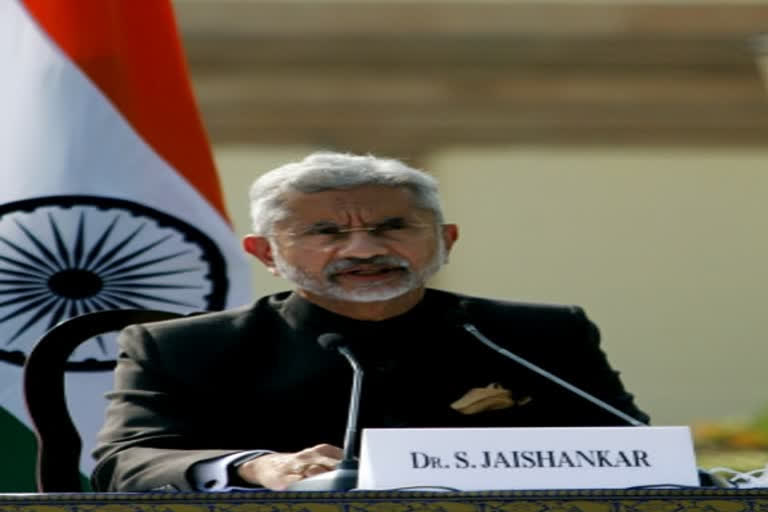New Delhi: External Affairs Minister Dr S Jaishankar on Friday said that Afghanistan needs a double peace. It needs peace within, and it needs peace around. Speaking at the Raisina session on “Junction Kabul: The Road to Peace", Jaishankar said, “Afghanistan needs a double peace –peace within the country and peace around the country. Afghanistan’s neighbours must contribute towards this”.
“The future of Afghanistan should not be a return to its past and the international community should take care not to throw the baby out with the bathwater”, he added.
He was joined by the National Security Advisor of Afghanistan, Hamdullah Mohib and former foreign minister of Iran Mohammad, Javad Zarif during the Raisina session.
The discussion on Afghanistan on the sidelines of the Raisina Dialogue comes at a time when the Istanbul conference on the Afghan peace process is slated to be held from April 24-May 4 between the representatives of Afghanistan and the Taliban. Turkey will host the Istanbul Conference.
Meanwhile, US President Joe Biden has announced that all American troops would be withdrawn from Afghanistan by September 11 this year, thus bringing to an end the country's longest war, spanning across two decades.
Read: US will continue to support Afghan people, says Prez Biden
India has been a strong stakeholder of the regional and international consensus-building process in bringing peace in Afghanistan and has always reiterated its stance that the peace process must be Afghan-led and owned, which means that the outcome of the process should be in the collective interests of the Afghan people.
Further, Jaishankar reiterated that there is a strong Indo –Afghan friendship and goodwill for India. “We will do whatever is in our power and interests by working with our neighbours to ensure that Afghanistan’s interests are protected. In the last 20 years, we have demonstrated through our actions and projects on the ground what our real feelings are for Afghanistan”, he said.
READ: Afghan envoy to India urges Taliban to leave the path of violence
India is among the six countries which also include- the United States, Russia, China, Pakistan, and Iran that would join the table to decide the roadmap for the Afghan peace process and given its stakes in Afghanistan, New Delhi takes a strong interest in bringing a solution to the decade long war in the country.
It is the United States that has been pushing for India’s inclusion in the peace process, to be a part of the mechanism, as it believes that’s South Asia’s biggest player, there is no other country than India better suited to do so.
Earlier on Wednesday, US President Biden said, “Our allies and partners have stood beside us shoulder-to-shoulder in Afghanistan for almost 20 years, we are deeply grateful for the contributions they have made to our shared mission and the sacrifices they have borne”.
Besides the United States, regional powers such as India, China, Russia, as well as NATO play a part in facilitating the peace process and have been consistently discussing the way forward to bring peace to the war-torn country.
Earlier this month, the Russian Foreign Minister was in New Delhi and he met EAM Jaishankar. Both the leaders presented their views on the Afghan peace process.
“For India, what happens in Afghanistan impacts its security directly. I shared our approach that a durable peace there would require harmonizing interests of all, both within and around that country. The peace process must be based on foundational principles to which we all subscribe. And a political solution should mean an independent, sovereign, united and democratic Afghanistan”, Jaishankar had said.
Underlining Russia’s stand on the Afghan peace process, Lavrov said, “A solution of the Afghan civil war should balance the ethnic and religious groups of Afghanistan and no group should be left out of the final settlement of the war. He said India and Russia are working for stability and connectivity in the Asia-Pacific and urged that “security alliances” should not come up in Asia.
Also Read: The world needs plurilateralism as multilateralism has fallen short: EAM Jaishankar



